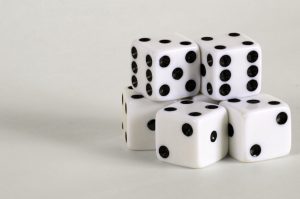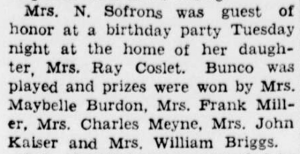 Dice clatter in succession over one, two, three tabletops, bouncing in spite of their edges and angles. Coasters are shifted, glasses are raised, and fruity fluids flow until their bit of bite raises volume and eyebrows simultaneously.
Dice clatter in succession over one, two, three tabletops, bouncing in spite of their edges and angles. Coasters are shifted, glasses are raised, and fruity fluids flow until their bit of bite raises volume and eyebrows simultaneously.
The animated expressions, tension in the air, and rotating arrangements of dark dots feel familiar, but perhaps more to some flashy casino; other elements of the environment place us elsewhere. Finger sandwiches, cut with precision, litter display plates while lipstick sticks to the lip of wine glasses. This saloon-type scene does not seem out of place despite its new location, however, since the tension here concerns bragging rights and fluctuating gossip rather than the risk of, say, thousands of dollars. Still, the energy to a typical bunco afternoon rivals that of any casino floor.
And yet, setting is a two part story; this well-kept, snack-filled, bunco-crazed home offers a where without a when. The clamor of our bunco tableau is constrained to no time but those where this type of exchange is possible. Dice alone cannot place our scene with much accuracy — the earliest found example of the die dates back to some time before 2500 B.C., and it is presumed that dice in general predate recorded history itself (“Dice”). Of course, assuming (as one from the 21st century might) that the dice were uniform so as to precipitate even results for each face, our ‘when’ may be constricted to time after the Renaissance (MacDonald). The name of the game and the domestic location work together to narrow down the time frame substantially — but not as much as you may think.
Bunco has evolved often as a game, existing with different titles, objectives, and rules over time, but 19th century England is generally considered its source (“Bunco History”). 8 Dice Cloth, its original moniker, (“Bunco”) was a confidence game: “an attempt to defraud a person or a group by gaining their confidence, […] usually adopted to obtain money or property of another” (“Confidence Game Law and Legal Definition,” par. 1). This concept of bunco can be thanked for its name, the suggestion of rolling “bunk” dice right within the grasp of the first syllable; the bunkness to bunco persisted in its journey to America in the middle of the century. One of the game’s first major resurgences (of which there are many; as often as one can be thrown in and out of favor while playing games of luck like this, bunco shifts in and out of popularity) cropped up in speakeasies about seventy years later when the seedy underbelly of Chicago began to thrive during the 1920s (Collins).
The following decade provided our first taste of the kind of bunco we’ve been seeking. When the end of prohibition meant speakeasies could no longer serve their original purpose and the nation began to suffer in the wake of economic collapse, it was the housewives of the Great Depression who tamed the wild beast bunco. Many games saw their first days of bringing joy and resentment to little communities during the 1930s, including giants like Monopoly (1933), Sorry! (1934), and Scrabble (1938). Counterintuitively, hard times generate some of the most ardent searches for entertainment, and while movies and books provided some relief in escapism, gaming as a leisure activity uniquely provides the added benefit of socialization.

Bunco is socialization in its very specifically gentrified setting of domesticity. The chatter doesn’t supplement the game, but dominates the atmosphere. You play bunco to talk with your friends, hence the significance of a game determined by pure luck and whose only relevant skills are counting and simple arithmetic. Bunco, more affectionately known by those on the inside as drunk-o, less affectionately known on the outs as the housewife’s drinking game (Chandler), is a social lubricant like the alcohol it is so often accompanied by; it serves its players as an excuse for connection.
Drowning in the lack of personal information I had been able to find on my great-great-grandmother, a housewife in the late 1930s, I began to begrudge all the brief mentions of her in the newspaper that only pointed to bunco and pinochle, a few luncheons and her wedding smattered about. When Kate Korytoski got married, according to the local papers, every instance of her afterwards was an instance of Mrs. Frank Miller — no trace of her maiden name, no trace of her first.
Where could I find her personality? She died much younger than she should have, but certainly she must have done something. I only happened to find some answers for my frustration through this bunco deep dive. Bunco was not (and is not) just a dice game, but indicative of a larger picture of the typical housewife of any time that our first scene could have been placed. Socializing is a life, a way of building community, and tossing dice well beyond when other games have been deemed too childish allows a simultaneous exploration of play and conversation. Rolling the dice on this topic provided me with more insight into Kate than I could have guessed — sometimes you win when you roll.
Works Cited
“Bunco.” Wikipedia, Wikimedia Foundation, 15 Jan. 2019. Accessed 3 Mar. 2019. en.wikipedia.org/wiki/Bunco.
“Bunco History.” World Bunco Association: The Official Site, www.worldbunco.com/history.html.
Chandler, Michael A. “Suburban Moms Forge Bonds Over Bunco: Dice Game Is Break From Daily Routine For Cul-De-Sac Set.” The Washington Post, WP Company, 4 Feb. 2007, www.washingtonpost.com/wp-dyn/content/article/2007/02/03/AR2007020301274_pf.html?noredirect=on.
“Chesterton News Briefs.” The Vidette-Messenger, 10 Mar. 1945, p. 3. Newspaper Archive, access.newspaperarchive.com/us/indiana/valparaiso/valparaiso-vidette-messenger/1945/03-10/page-3.
Collins, Scott. “Bunco Fever.” Chicago Tribune, Chicago Tribune, 10 Oct. 1993, www.chicagotribune.com/news/ct-xpm-1993-10-10-9310100059-story.html.
“Confidence Game Law and Legal Definition.” USLegal, definitions.uslegal.com/c/confidence-game/.
“Dice.” Wikipedia, Wikimedia Foundation, 3 Mar. 2019. Accessed 4 Mar. 2019. en.wikipedia.org/wiki/Dice
MacDonald, James. “The Ancient Origins of Dice.” JSTOR Daily, ITHAKA, 18 Feb. 2018, daily.jstor.org/the-ancient-origins-of-dice/.